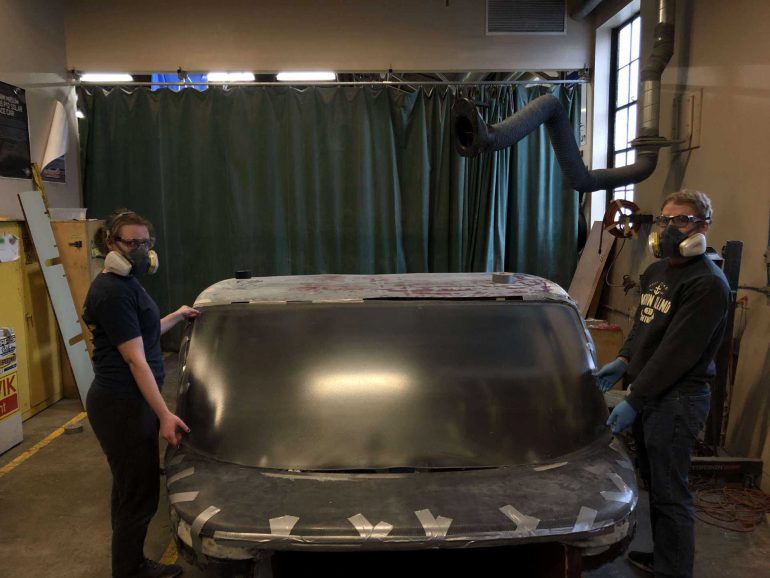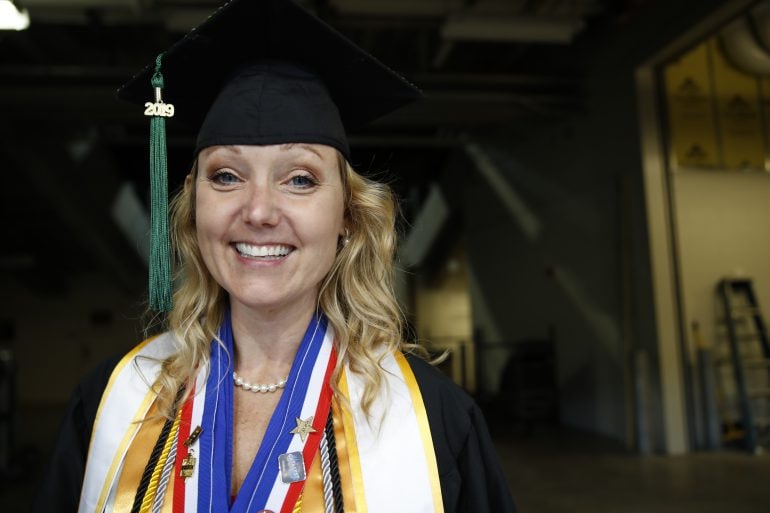
Transfer student transitions: Learning to balance everything under the sun (car)
Thumbnail Photo: Two members of Solar Car holding a windshield above the newly constructed solar car. From left to right: Rachel Eckert, Composites Manager & Materials Engineer; Samuel Winter, Aerospace Engineer.
A new university, a new horizon. Since last spring, I have graduated from Des Moines Area Community College (DMACC) and transferred to Iowa State University (ISU) to pursue my bachelor’s degree in Software Engineering. The overall transition from a two-year college to a four-year university was thankfully uneventful; however, I would soon realize the difference in how I should manage my time and work.
Getting Involved (Again)
After transferring, I was unable to continue my previous club activities – as most clubs at DMACC didn’t exist at ISU. I began a quest to find new clubs and hobbies. I ran into an old colleague who mentioned a club they were in, Solar Car. I attended the following Solar Car team meeting and joined as an electrical member. My primary task was to learn how to read circuit board schematics and aid an older member with designing a battery protection system to monitor the car’s Lithium-Ion batteries.
In addition to being involved with Solar Car, I was interviewed and accepted for a part-time IT Technician position on-campus within the Psychology Department. As a technician, I responded to faculty requests regarding problems with their electronic equipment. On top of both positions, I continued full-time school at ISU and began to delve into my coursework, but I failed to realize the predicament I placed myself in. Not only would I have to choose what I enjoyed most, but I would also learn valuable lessons in time management.
Timing Trouble
By midterms, I began to notice my work piling up unproportionally across all three tasks. As the semester progressed, each task became more demanding with varying expectations. The increasing expectations and workload resulted in several consequences. The two most notable and foremost consequences were my declining homework quality and diminishing amount of sleep. In an attempt to correct my time management errors, I spent more time working late at night to catch up on homework. This not only resulted in a poorer quality of work, but it also reduced my number of hours of sleep. To top it all off, the more time I committed to work, the less time I was able to spend with my family, even during holiday breaks.
Despite my attempts to manage all three tasks, I still deviated from my intended goals and needed to cut my losses during the last few weeks of the semester. I reduced my work on Solar Car, cut back my hours at work, and submitted the homework I could produce within the hours I allotted. This admission helped me regain some sleep and focus for final examinations.
Keep Moving Forward
Taking on a job while balancing coursework and car manufacturing was a worthwhile endeavor. This circumstance brought to light how much I have yet to comprehend regarding time management, but I also learned a great deal about different engineering majors, computer management, and a wide range of topics from my classes. With the deviation from my goals and a poor management of time and work, I learned a few valuable lessons:
- One, when scheduling courses and extracurricular activities, ensure that the time scheduled is rarely deviated.
- Two, schedule everything as early as permittable.
- Finally, while work comes first, ensure there is plenty of time for rest and relaxation.
I will undoubtedly incorporate these ideas into my schedule next semester and beyond. As the future brings a spectrum of challenges, I will continue Solar Car as an Electrical Systems Manager and remain confident no matter what the future may hold. There will always be something to look forward to as the sun rises.




